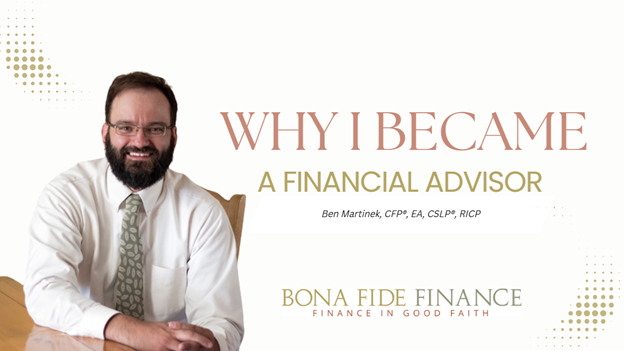
The First Years With a Six-Figure Salary: Financial Planning for Physicians
After years of hard work, you’re finally making six figures as a physician. Read our latest article to learn how to manage your finances at this stage of your career.

After years of hard work, you’re finally making six figures as a physician. Read our latest article to learn how to manage your finances at this stage of your career.

I became a financial advisor to provide real, objective advice—not make sales. Read on to hear how my journey shaped my mission at Bona Fide Finance.

Greetings all! The holiday season is upon us, and we at Bona Fide are preparing to stay busy for the

Greetings, Last month, we spent some time discussing and sharing some resources centered around retirement. More specifically, what makes for

Greetings all, As financial planners, we at Bona Fide Finance spend a lot of time working with people to get

Greetings all, April is here and taxes are at the top of most people’s minds. For this newsletter, we are


Greetings! We hope you and your loved ones are enjoying the fullness of summer! One of our favorite events of this

Greetings, all! We hope your year has gotten off to a productive start! At the Bona Fide base, we have been busy and

Retirement saving and planning: If you have made prudent financial choices that will allow you to retire early (early meaning before
Deb has been with Bona Fide Finance since its inception in 2015 and long before that with her support of Ben studying for the CFP designation and the dream of starting the business of helping individuals and families meet their financial goals.
She fills the Relationships Specialist role – Deb is typically the first encounter our new clients have as she walks them through our service offerings and introduces them to the map of financial literacy.
She has a bachelor’s degree from Ball State University and a master’s degree from the Franciscan University of Steubenville. Deb lives in Bismarck with Ben and their two young daughters, is a card-carrying member of the CDL club (read more about those adventures here) and is happiest reading an epic novel, solving a 1000-piece jigsaw puzzle, or working in her kitchen where she can serve love to the people in her life through quality food (clients enjoy her holiday shipment of homemade goodies each December!).
Ben Martinek, CFP®, EA, CSLP®, RICP®, is the founder and lead advisor at Bona Fide Finance, an independent, fee-only firm dedicated to helping doctors, young professionals, and growing families take control of their financial future. With a deep understanding of student loan debt—having tackled his own—Ben specializes in guiding clients through debt repayment strategies, smart investing, and comprehensive financial planning so they can build wealth with confidence. Ben’s passion for financial planning comes from his desire to provide honest, objective advice tailored to each client’s unique situation. He loves seeing the impact of his work, whether it’s helping a family pay off student loans years ahead of schedule, setting up an early retiree for financial freedom, or giving clients the peace that comes from knowing their finances are in order. His clients appreciate his thoughtful, high-touch approach, often saying that working with him has changed their lives.
Before launching Bona Fide Finance in 2015, Ben’s career path was anything but conventional. The fourth of nine children, he grew up in rural Indiana and initially pursued a path in academia, earning a B.A. in philosophy and classical languages, followed by a master’s degree in philosophy. Along the way, he explored careers in construction and truck driving—logging over 600,000 miles across the U.S. with his wife, Deb—before finding his true calling in financial planning.
Now based in Bismarck, North Dakota, Ben and Deb stay busy raising their two daughters, Edith and Virginia. Since their truck-driving days, Ben is happiest on a long road trip—preferably behind the wheel of his TDI Volkswagen Jetta. He enjoys sailing on Lake Sakakawea, camping in their vintage ’90s pop-up camper, and smoking a pipe by the grill. A lover of strategy board games, he favors Clans of Caledonia (mostly because Deb refuses to play Risk with him). When he’s not working with clients, he can be found smoking meat, gardening, hiking, or diving into The Lord of the Rings or Dune. Ben also serves on the school board for his daughters’ Montessori school and is actively involved in pre-marriage ministry in the Bismarck Diocese.